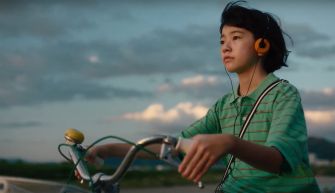Renoir Movie Review

RENOIR
Tokyo, 1987. Eleven-year-old Fuki lives between a hospitalized father and an overwhelmed, absent mother. A suspended summer begins for Fuki, between solitude, strange rituals, and childhood impulses. The portrait of a little girl with extraordinary sensitivity, who seeks to connect with the living, the dead, and perhaps with herself.
Film Review
Revealed in 2022 with Plan 75, a fascinating and fatalistic dystopia about aging and euthanasia in contemporary Japan, Chie Hayakawa continues her exploration of the margins of Japanese society with Renoir, presented in competition at Cannes this year. Abandoning anticipation for a more intimate story set in the 1980s, the director confirms a rare directorial sensibility, both modest and precise, in the observation of the questions, silences, and small details that weave our lives.
Despite its title, Renoir is neither a biopic nor a film about the artist. It is simply a reference to the famous portrait by Irène Cahen of Antwerp that hung in the hospital room of a terminally ill father. This father is the father of the young girl at the center of the film, 11-year-old Fuki, who struggles to come to terms with her father’s imminent death while coming to terms with loneliness, between an absent mother and a world of adults whose words and attitudes are often opaque.
Carried by the astonishingly accurate performance of the young Yui Suzuki, Fuki’s trajectory avoids the pitfalls of sentimentality. Hayakawa films at the child’s eye level, without overhanging or heavy-handed effects, with a restrained grace that evokes the cinema of his illustrious elders (Kore-eda, Sōmai). The dialogues, ultimately quite sparse, never reveal too much, and the numerous ellipses leave the viewer space to feel. The Japanese filmmaker’s direction, for its part, focuses more on details – the light on a curtain, a play of telepathy – and constructs, through delicate impressionistic touches, a superb chronicle of childhood, mourning, and resilience. Classic cinema experiences
While Renoir never sought the spectacular and didn’t necessarily receive the welcome he deserved on the Croisette, he nevertheless impresses in what he manages to capture: the fleeting brilliance of an emotion, a look, a suspended moment, or a tragedy narrowly avoided. After an impressive debut, Chie Hayakawa establishes himself, with this second feature, as one of the most subtle and promising voices in contemporary Japanese cinema.